Growth Hacking Culture
The Growth Hacking Culture Podcast is a series of insightful interviews with prominent experts on mindsets, skills and mental resources to grow individually, lead motivated teams and create human-centric work cultures.
These episodes are about thought provoking ideas to scale up and growth hack human-centric and performing work cultures.
Hosted by Ivan Palomino.
The Growth Hacking Culture Podcast is a series of insightful interviews with prominent experts on mindsets, skills and mental resources to grow individually, lead motivated teams and create human-centric work cultures.
These episodes are about thought provoking ideas to scale up and growth hack human-centric and performing work cultures.
Hosted by Ivan Palomino.
Episodes
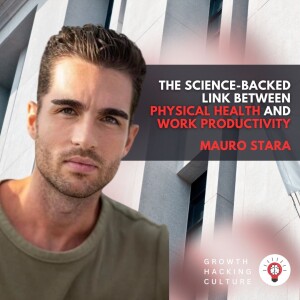
Wednesday Jul 24, 2024
Mauro Stara on The Science Link Between Physical Activity and Performance at Work
Wednesday Jul 24, 2024
Wednesday Jul 24, 2024
In this insightful episode, I open up about my journey from a work-centric life that led to deteriorated mental health to my quest for understanding where things went wrong. This pivotal shift ignited my interest in the profound impact of physical activity on performance. Mauro Stara, founder of Six Pack CEO and a renowned peak performance expert, joins me to delve into this topic. Mauro, a trusted advisor to high-achieving CEOs and business owners, is known for his unique approach that focuses on advanced blood work testing and personalized coaching to address hormonal imbalances.
Through his expertise, Mauro helps clients achieve sustainable transformations, reclaiming vitality and confidence even with their demanding schedules. Together, we explore common misconceptions about physical health and productivity, the scientific link between them, and practical tips for busy professionals to enhance their well-being and efficiency.
About Mauro Stara
Mauro Stara, founder of Six Pack CEO, is a peak performance expert and trusted advisor to successful CEOs and business owners. Known as the last resort for those exhausted from mainstream approaches, Mauro specializes in resolving challenges where others have failed. By prioritizing advanced blood work testing and personalized coaching, he tackles the root cause of stagnation: hormones. With his guidance, clients achieve lifelong, sustainable transformations, reclaiming vitality and confidence amidst demanding schedules.
How to reach Mauro Stara:
LinkedIn: https://www.linkedin.com/in/mauro-stara-4b4295217/
Instagram https://www.instagram.com/maurostaraofficial/
What We Discussed in this Episode on Physical Health and Productivity:
- What are some common misconceptions about physical health and productivity that you'd like to clear up?
- Can you explain what science says about the link between physical health and work productivity?
- How does physical health impact cognitive function and decision-making at work?
- Are there specific areas of physical health that have a greater impact on productivity (e.g., cardiovascular health, sleep quality)?
- Can you offer practical tips for busy professionals to improve their physical health and subsequently, their productivity?
- How do you see the future of workplace wellness programs impacting employee health and productivity?
- Can you share any personal anecdotes or success stories that illustrate the link between physical health and work productivity?BONUS CONTENT -The Habit Hack: How to Change Your Company Culture One Routine at a Time >> https://www.peoplekult.com/post/the-habit-hack-how-to-change-your-company-culture-one-routine-at-a-time
_____
About the Growth Hacking Culture Podcast
The Growth Hacking Culture Podcast is a series of insightful interviews with prominent experts on mindsets, skills and mental resources to grow individually, lead motivated teams and create human-centric work cultures. These episodes are about thought provoking ideas to scale up and growth hack human-centric and performing work cultures. Hosted by Ivan Palomino
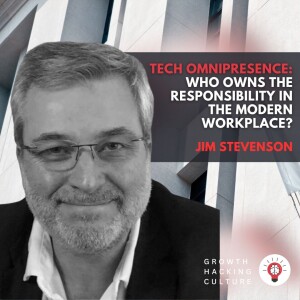
Tuesday Jul 16, 2024
Tuesday Jul 16, 2024
In today's digital age, technology transcends the confines of the IT department, integrating into every role—from marketing and sales to customer service and even janitorial staff. This pervasive presence, which we term Tech Omnipresence, prompts a crucial question: Who holds the responsibility for technology in the modern workplace? Is it solely the IT team, expected to be tech wizards for everyone?
About Jim Stevenson [CEO of Bletchley Group]
Meet Jim Stevenson, a renowned expert in Strategy, Transformation, and Growth. As the Founder and CEO of Bletchley Group, an international growth consultancy, Jim believes that while technology is powerful, it should always serve a meaningful purpose.
More about Jim: On LinkedIn https://www.linkedin.com/in/jimstevenson/ or in his website https://www.bletchleygroup.com/
What We Discussed in this Episode about Tech Omnipresence
- How technology has reshaped workplace responsibilities.- Challenges in managing technology and its impact on employees.- The role of CIOs, CTOs, and alternative tech responsibility structures.- Empowering employees to be tech-savvy and innovative.- The benefits of "Tech Champions" versus distributed tech ownership.- Essential skills and mindsets for future tech leaders.- Preparing for evolving technologies and adaptable responsibility models.- Anecdotes and case studies on effective tech responsibility.
****
Sign up for the Simply Human Newsletter (monthly email newsletter): https://simplyhuman.substack.com
For show notes and past guests on the Growth Hacking Culture Podcast: https://www.peoplekult.com/podcast-work-culture
Follow Ivan Palomino on Twitter: https://twitter.com/ivanpalomino_
Follow Ivan Palomino on LinkedIn: https://www.linkedin.com/in/ipalomino/
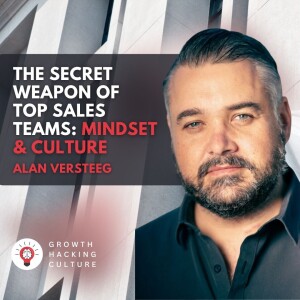
Tuesday Jul 09, 2024
Alan Versteeg on The Secret Weapon of Top Sales Teams: Mindset & Culture
Tuesday Jul 09, 2024
Tuesday Jul 09, 2024
Building a strong sales culture is crucial for driving consistent revenue growth and attracting top sales talent. However, several challenges can hinder this process for corporations. Here are some key obstacles, along with research to support them:
1. Misalignment Between Sales and Other Departments:
Challenge: When sales goals are siloed from overall company objectives, it creates friction and distrust between sales and other departments like marketing, product development, and customer service. This lack of alignment can lead to inconsistent messaging, poor product-market fit, and ultimately, dissatisfied customers.
Research: A study by CSO Insights found that only 42% of salespeople believe their marketing department is "highly effective" at generating qualified leads.
2. Lack of Focus on Customer Experience:
Challenge: When the sales process prioritizes closing deals over building long-term customer relationships, it creates a transactional and unsustainable approach. This mindset can lead to high churn rates and damage the company's reputation.
Research: According to a Salesforce report, 76% of customers expect companies to understand their needs and expectations.
3. Short-Term Focus and Pressure to Meet Quotas:
Challenge: An overemphasis on hitting immediate sales targets can lead to unethical practices, poor product/service recommendations, and ultimately, customer dissatisfaction. This short-term mentality can also discourage investment in developing long-term customer relationships and employee skills.
Research: A study by the Harvard Business Review found that a focus on short-term sales goals can lead to unethical behavior, such as pressure to misrepresent products or services.
4. Inadequate Coaching and Development:
Challenge: Without ongoing coaching and development opportunities, salespeople struggle to adapt to changing market conditions, refine their skills, and stay motivated. This can lead to knowledge gaps, outdated techniques, and a lack of engagement with the sales process.
Research: According to a study by the Sales Management Association, only 20% of salespeople believe their companies provide them with adequate sales training.
5. Unclear Recognition and Reward Systems:
Challenge: Inconsistent or unclear recognition and reward systems can demotivate salespeople and fail to incentivize the desired behaviors. When rewards are solely based on closed deals, it discourages collaboration, knowledge sharing, and long-term customer focus.
Research: A study by Gartner found that 74% of sales reps are dissatisfied with their current compensation plans.
About My Guest Alan Versteeg
Meet Alan Versteeg, an engineer turned sales management expert. Initially skeptical about the sales world, Alan applied engineering principles of cause and effect to sales management, transforming his career. He co-founded Growth Matters, developing over 2,000 sales managers across 45+ countries and diverse industries.
His company Growth Matters: https://www.growthmattersintl.com/
Alan's LinkedIn Profile https://www.linkedin.com/in/alanversteeg/
What We Discussed in this Episode on Mindset & Culture in Top Sales Teams
- Key differences between average and top-performing sales teams.- How to cultivate a growth mindset in sales teams.- Practical strategies for developing a winning mindset.- Essential elements of a high-performing sales culture.- Creating a culture of collaboration and knowledge sharing.- Challenges in building a strong sales culture.- Trends shaping the future of sales.
****
Sign up for the Simply Human Newsletter (monthly email newsletter): https://simplyhuman.substack.com
For show notes and past guests on the Growth Hacking Culture Podcast: https://www.peoplekult.com/podcast-work-culture
Follow Ivan Palomino on Twitter: https://twitter.com/ivanpalomino_
Follow Ivan Palomino on LinkedIn: https://www.linkedin.com/in/ipalomino/
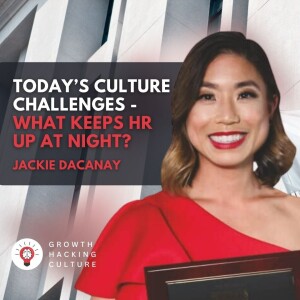
Tuesday Jul 02, 2024
Jackie Dacanay on Today’s Culture Challenges - What Keeps HR Up at Night?
Tuesday Jul 02, 2024
Tuesday Jul 02, 2024
In this Episode on Today’s Culture Challenges - What Keeps HR Up at Night?
- The Unique work culture challenges in hospitality- Biggest work culture challenges for HR directors- Key HR career insights on work culture- Post-COVID changes for HR professionals- Managing stress as an HR director- HR technical skills for work culture- Growth mindset advice for HR leaders
HR departments face significant cultural challenges, including balancing remote, hybrid, and in-office work, reimagining employee well-being, and enhancing the employee value proposition (EVP). They must create solutions to keep all employees connected, prioritize a supportive work culture, and offer competitive compensation and growth opportunities.
But also, HR professionals also experience stress from an evolving workplace, staffing shortages, and handling sensitive issues like layoffs, requiring them to stay updated on trends and adapt their skills.
About My Guest: Jackie Dacanay
She is the Director of Organizational Culture & Belonging at Fairmont San Francisco. Jackie has received numerous accolades, including the Silicon Valley YWCA Tribute to Women Executive Leadership Award and the Silicon Valley Business Journal 40 under 40.
Know more about Jackie on LinkedIn https://www.linkedin.com/in/jackie-dacanay-8b0a8a34/ or reach out on jackie.dacanay@fairmont.com
****
Sign up for the Simply Human Newsletter (monthly email newsletter): https://simplyhuman.substack.com
For show notes and past guests on the Growth Hacking Culture Podcast: https://www.peoplekult.com/podcast-work-culture
Follow Ivan Palomino on Twitter: https://twitter.com/ivanpalomino_
Follow Ivan Palomino on LinkedIn: https://www.linkedin.com/in/ipalomino/
About the Growth Hacking Culture Podcast
The Growth Hacking Culture Podcast is a series of insightful interviews with prominent experts on mindsets, skills and mental resources to grow individually, lead motivated teams and create human-centric work cultures. These episodes are about thought provoking ideas to scale up and growth hack human-centric and performing work cultures. Hosted by Ivan Palomino.
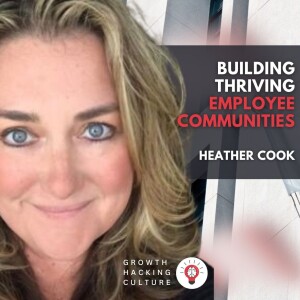
Tuesday Jun 25, 2024
Tuesday Jun 25, 2024
In the past five years, the workplace has transformed, with remote and hybrid models becoming common and creating new challenges for fostering community among employees.
Studies show that connected employees have higher job satisfaction, engagement, and productivity, while strong employee communities reduce turnover rates.
Building a thriving community is about more than virtual coffee breaks; it requires creating spaces where genuine connections flourish, aided by technology. This episode of GHC explores how tech bridges distances, enhances communication, and fosters collaboration, all while keeping human connections at the forefront.
About Heather Cook
Heather Cook is the Principal Program Manager in the Microsoft 365 Customer Advocacy Group at Microsoft, leading Global Community Evangelism, Engagement, and Events. As the Founder of Creative Maven, Heather brings over two decades of experience in producing events, campaigns, and experiences in the high-tech and entertainment industries.
Reaching out to Heather Cook:
Maven Musing Newsletter: https://www.linkedin.com/newsletters/maven-musings-7137925560579588097/
On Twitter https://twitter.com/heddamaven
On LinkedIn https://www.linkedin.com/in/heathernewman/
On Instagram https://www.instagram.com/heddamaven/
What We Discussed in this Episode on Employee Communities:
- Key challenges in fostering employee community in hybrid or remote work settings.- The importance of workplace community versus external connections.- Fundamental aspects of building strong human connections beyond technology.- Strategies for facilitating connections and collaboration, regardless of location.- Effective use of existing technology to foster community.- Preventing technology from becoming a barrier to human connection.
###
Sign up for the Simply Human Newsletter (monthly email newsletter): https://simplyhuman.substack.com
Follow the Growth Hacking Culture Podcast: https://www.peoplekult.com/podcast-work-culture
Follow Ivan Palomino on Twitter: https://twitter.com/ivanpalomino_
Follow Ivan Palomino on LinkedIn: https://www.linkedin.com/in/ipalomino/
About the Growth Hacking Culture Podcast
The Growth Hacking Culture Podcast is a series of insightful interviews with prominent experts on mindsets, skills and mental resources to grow individually, lead motivated teams and create human-centric work cultures. These episodes are about thought provoking ideas to scale up and growth hack human-centric and performing work cultures. Hosted by Ivan Palomino.
🔔 Don't forget to like, subscribe, and hit the notification bell for more insightful content!
######
#community #belonging #microsoft #creativemaven #humantech
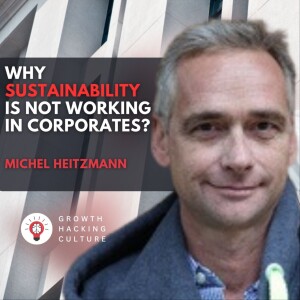
Tuesday Jun 18, 2024
Tuesday Jun 18, 2024
Corporate sustainability is on the rise, with over 98% of S&P 500 companies publishing sustainability reports in 2022 and more than 8,000 entities pledging net zero emissions by 2050. A TravelPerk study reveals that 69% of employees want their companies to invest in sustainability. However, challenges like greenwashing, data fragmentation, and poor data quality hinder true sustainability performance and accountability. Despite the progress, there's a need for better transparency and measurable links between sustainability efforts and business outcomes.
About Michel Heitzmann [founder of Ignea]
Michel Heitzmann, creator of the Vital Growth Framework for sustainable leadership and founder of Ignea, is a seasoned expert in sustainability. He has worked in several C-suite positions at Fortune 500 companies, served as a strategy advisor, and been a board member of multiple organizations focused on environmental and sustainability issues in Switzerland.
Contact Michel @ Ignea https://www.ignea.ltd/
or in LinkedIn https://www.linkedin.com/in/michel-heitzmann/
What I discussed with Michel Heitzmann
- What are some red flags that indicate a company might be greenwashing?- How can consumers and investors hold corporations accountable for their sustainability claims?- Beyond greenwashing, what are the main obstacles to achieving true sustainability in corporations?- How can corporations overcome internal resistance to change and create a culture of sustainability?- What are some effective strategies for corporations to implement meaningful sustainability measures?- How can we hold corporations accountable for progress on their sustainability commitments?- Do you have any heroes or companies that have been successful in their sustainability efforts?- What advice would you give to individuals interested in promoting sustainability within their own companies?
###
Sign up for the Simply Human Newsletter (monthly email newsletter): https://simplyhuman.substack.com
Follow the Growth Hacking Culture Podcast: https://www.peoplekult.com/podcast-work-culture
Follow Ivan Palomino on Twitter: https://twitter.com/ivanpalomino_
Follow Ivan Palomino on LinkedIn: https://www.linkedin.com/in/ipalomino/
About the Growth Hacking Culture Podcast
The Growth Hacking Culture Podcast is a series of insightful interviews with prominent experts on mindsets, skills and mental resources to grow individually, lead motivated teams and create human-centric work cultures. These episodes are about thought provoking ideas to scale up and growth hack human-centric and performing work cultures. Hosted by Ivan Palomino.
######
🔔 Don't forget to like, subscribe, and hit the notification bell for more insightful content!
#CorporateSustainability #SustainabilityEfforts #Greenwashing #MichelHeitzmann #SustainableLeadership #EnvironmentalImpact #CorporateResponsibility
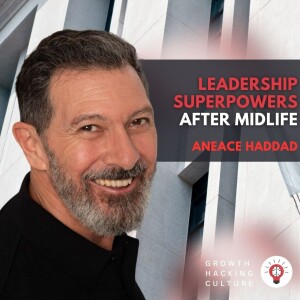
Tuesday Jun 11, 2024
Tuesday Jun 11, 2024
For decades, leadership narratives have often centered on youthful energy and fresh perspectives. But what if the true key to exceptional leadership lies not in age, but in the accumulated wisdom and experience gained through life's journey? Discover how these elements ignite the building of superpowers at midlife.
About Aneace Haddad
Meet Aneace, a former tech CEO turned C-suite executive coach, senior advisor at McKinsey, and external facilitator at Deloitte University. Dive into his insights on midlife leadership in his latest book:
📘 Soaring Beyond Midlife: The Surprisingly Natural Emergence of Leadership Superpowers in Life’s Second Half - Get it here: https://a.co/d/icVCWT9
Learn more about Aneace on https://aramyss.com/
Key Questions Answered in this episode about Leadership Superpowers after Midlife:
- What are some of the biggest misconceptions about leadership, especially for midlife leaders?- What challenges do midlife leaders face?- How can midlife leaders overcome the perception that their best years are behind them?- What are the superpowers that midlife leaders can develop and rely on?- How can leaders seize the opportunity to develop these superpowers?- Is "not making the time for self-awareness" a significant issue for midlife leaders?- How can midlife leaders combat ageism?- What are your personal goals for the future as part of your own roadmap?
Bonus reading on Leadership:
Authentic Leadership: Strategies for Effective Role Modeling
The Power of Role Modeling: How Leaders Impact Our Brains & Behaviors
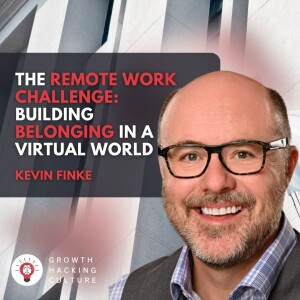
Tuesday Jun 04, 2024
Tuesday Jun 04, 2024
Today's episode tackles a challenge that's become increasingly relevant in our ever-evolving work landscape: building belonging in a virtual world.
Did you know that over 70% of remote workers feel isolated or lonely? While the flexibility and convenience of remote work are undeniable, the lack of physical connection can take a toll.
This episode is your roadmap to fostering a sense of belonging in your virtual team. We'll be diving deep into the science behind connection, exploring practical strategies for building camaraderie, and uncovering the unexpected benefits of strong virtual relationships.
About Kevin Finke
Founder of Experience Willow, he is a highly acclaimed experience consultant renowned for advising business leaders on the crucial role of creating inclusive and belonging-focused workplaces.
Learn more about Kevin Finke on:
www.kevinfinke.com
https://www.experiencewillow.com/
https://www.linkedin.com/in/kevinfinke/
What We Discussed in this Episode about Belonging in a Virtual World:
- Identifying Major Roadblocks in Remote Work Environments- Impact of Loneliness on Remote Workers- Leveraging Neurochemicals for Building Belonging- Fostering Team Spirit in Remote Work- Encouraging Informal Interactions in Remote Teams- Integrating New Team Members in Remote Settings- Designing Inclusive Remote Work Environments
Bonus reading on Belonging at Work:
The Need of Belonging at Work: How it Affects Employees and Organizational Success https://www.peoplekult.com/post/the-need-of-belonging-at-work-how-it-affects-employees-and-organizational-success
###
Sign up for the Simply Human Newsletter (monthly email newsletter): https://simplyhuman.substack.com
Follow the Growth Hacking Culture Podcast: https://www.peoplekult.com/podcast-work-culture
Follow Ivan Palomino on Twitter: https://twitter.com/ivanpalomino_
Follow Ivan Palomino on LinkedIn: https://www.linkedin.com/in/ipalomino/
About the Growth Hacking Culture Podcast
The Growth Hacking Culture Podcast is a series of insightful interviews with prominent experts on mindsets, skills and mental resources to grow individually, lead motivated teams and create human-centric work cultures. These episodes are about thought provoking ideas to scale up and growth hack human-centric and performing work cultures. Hosted by Ivan Palomino.
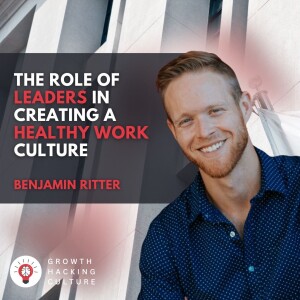
Wednesday May 29, 2024
Dr. Benjamin Ritter on The Role of Leaders in Creating a Healthy Work Culture
Wednesday May 29, 2024
Wednesday May 29, 2024
In a recent study conducted in 2021, it was revealed that an overwhelming 88% of employees attribute significant influence over company culture to senior leaders. Moreover, a subsequent survey conducted by Robert Half in 2023 shed light on the staggering fact that 60% of workers have contemplated departing from their current roles, citing dissatisfaction with their supervisors as a primary reason.
About Dr. Benjamin Ritter
Dr. Benjamin Ritter, renowned for his expertise in leadership development, serves as the founder of Live for Yourself Consulting. He boasts a multifaceted portfolio, excelling as an international leadership and career coach, Senior Talent Management Consultant, and a leading voice in career development and executive coaching on LinkedIn.
Notably, he is also recognized as an international speaker, a connoisseur of values, an esteemed online instructor, and the host of two insightful podcasts: The Executive Podcast and The Live for Yourself Revolution Podcast.
Benjamin will be launching his book Becoming Fearless [a Journey from self-doubt to self-mastery] in September 2024 - subscribe to his wait list on https://benjamin-ritter.com/
Reaching out to Benjamin Ritter:
https://www.linkedin.com/in/drbenjaminritter-leadershipdevelopment/ or on https://www.liveforyourselfconsulting.com/
What We Discussed in the Episode on The Role of Leaders in Creating a Healthy Work Culture:
- What is the biggest risk that you see today regarding work culture?- What are the key characteristics of leaders who foster healthy work cultures?- How can leaders empower employees to have ownership and control over their work?- What are effective ways to encourage open communication and feedback within a team?- What are the skills that we can only learn from a leader and not from training?- What are the psychology books that you would recommend leaders to read?- What are some practical steps leaders can take today to have the mental bandwidth to start improving their work culture?- What role can leaders play in promoting work-life balance and preventing burnout?
###
Sign up for the Simply Human Newsletter (monthly email newsletter): https://simplyhuman.substack.com
Follow the Growth Hacking Culture Podcast: https://www.peoplekult.com/podcast-work-culture
Follow Ivan Palomino on Twitter: https://twitter.com/ivanpalomino_
Follow Ivan Palomino on LinkedIn: https://www.linkedin.com/in/ipalomino/
About the Growth Hacking Culture Podcast
The Growth Hacking Culture Podcast is a series of insightful interviews with prominent experts on mindsets, skills and mental resources to grow individually, lead motivated teams and create human-centric work cultures. These episodes are about thought provoking ideas to scale up and growth hack human-centric and performing work cultures. Hosted by Ivan Palomino.
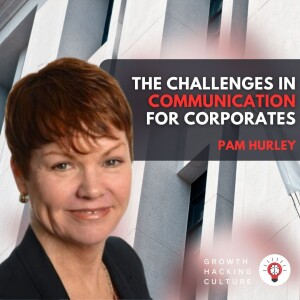
Wednesday May 22, 2024
Pam Hurley on The Upcoming Challenges in Communication for Corporates
Wednesday May 22, 2024
Wednesday May 22, 2024
According to a report by McKinsey in 2019, a staggering 70% of employees identified ineffective communication as a significant impediment to company performance. Additionally, a Gallup poll conducted in 2022 uncovered that merely 21% of employees strongly agree with the effectiveness of communication by senior leaders.
About Pam Hurley
Pam Hurley stands out as a highly regarded expert in communication. As the founder of Hurley Write, Inc., she has crafted a curriculum that numerous companies rely on to enhance their teams' abilities in writing, storytelling, and presentation skills.
Reaching out Pam Hurley
https://www.hurleywrite.com/
https://www.linkedin.com/in/Hurleywrite/
What We Discussed in this Episode on The Challenges in Communication for Corporates:
- Is communication the elephant in the room in the corporate world? Are corporates better or are there new challenges?- How can companies ensure clear and concise communication within a complex organizational structure?- How can companies measure the effectiveness of their internal communication strategies?- Beyond rhetoric, structure, and syntax in communication - are organizations having challenges bringing an emotional connection to their people? Is storytelling part of the solution?- Are companies using the best way to teach their employees how to communicate? What would you recommend instead of the traditional 2-3 days ‘training’?- Will the rise of generative AI positively impact the future of communication?- How does it look the future of communication in corporates?
#####
Listen in real-time to the voice of your employees
Culturama Live is an AI system that helps boards and management understand their company’s true state by continuously analyzing crowdsourced employeeopinions, sentiments and ideas in their own words.
Learn more: https://www.peoplekult.com/ai-people-voice-and-culture
About the Growth Hacking Culture Podcast
The Growth Hacking Culture Podcast is a series of insightful interviews with prominent experts on mindsets, skills and mental resources to grow individually, lead motivated teams and create human-centric work cultures. These episodes are about thought provoking ideas to scale up and growth hack human-centric and performing work cultures. Hosted by Ivan Palomino.









